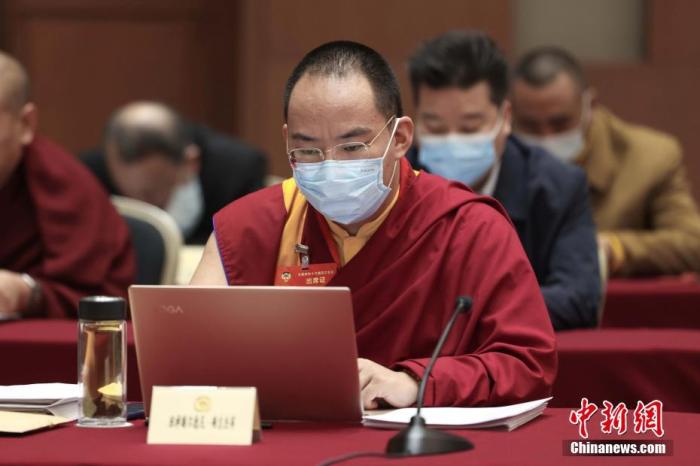(Characters of the Two Sessions) Panchen Erdeni Chokyi Jeb: Tibetan Buddhism should better serve national development, social progress and people's happiness
China News Service, Beijing, March 10th: Panchen Lama Erdeni Chokyi Jeb: Tibetan Buddhism should better serve national development, social progress and people's happiness
China News Agency reporter Li Hanxue
Panchen Erdeni Chokyi Jeb, member of the Standing Committee of the National Committee of the Chinese People's Political Consultative Conference, vice president of the Buddhist Association of China, and president of the Tibetan branch of the Buddhist Association of China, pointed out in an exclusive interview with a reporter from China News Agency during the National Two Sessions that after the founding of New China and the democratic reform of Tibet, Tibetan Buddhism has obtained its original source and has gradually adapted to the socialist society. However, more exploration, reform and progress are still needed in terms of teachings, canons, etiquette and customs, and belief methods, so as to better serve the development of the country, social progress and people's happiness.
Data map: Panchen Erdeni Chokyi Jeb.
Photo by China News Agency reporter Yang Chengchen
For nearly half a year last year, the Panchen Lama went to Tibet and Shezangzhou County in Sichuan and Gansu to study and visit and conduct social research.
He said that the changes in the production and life of farmers and herdsmen were "beyond imagination": "For example, Naqu'anduo County, Shenza County, and Shuanghu County, which are over 4,500 meters above sea level, were originally thought to be very poor and backward. It was discovered there that not only access, electricity, water, internet, and heating are provided, but local people are also talking about hot topics in first- and second-tier cities.”
He said that he was very moved to see these.
Under the leadership of the Communist Party of China, Tibet has enjoyed the development fruits of reform and opening up, and the Tibetan people and the Chinese people of all ethnic groups have realized the building of a moderately prosperous society in an all-round way.
Along with the social and economic progress of Tibet, Tibetan Buddhism has also undergone positive changes.
The Panchen Lama said that Tibetan Buddhism is a historical product of the Sinicization of Buddhism, but under the erosion of the old feudal serfdom in Tibet, its social functions have changed, contrary to the original wishes of the Buddha, and once became a tool for serf owners to rule over serfs.
After the founding of New China and the democratic reform of Tibet, Tibetan Buddhism was brought to its original source and gradually adapted to the socialist society.
The Panchen Lama said that the socialist society with Chinese characteristics has entered a new era, and Tibetan Buddhism should better meet the needs of the country and the people, and better serve the country's development, social progress and people's happiness.
"Of course, there is still a long way to go before we can complete the historical burden of our generation of Tibetan Buddhists." The Panchen Lama said that in order to adhere to the sinicization of my country's religion, Tibetan Buddhism still needs to improve its teachings, canons, etiquette and customs, beliefs There are more explorations, reforms and progress in all aspects such as methods.
For example, more work should be done to remove superstition, utilitarianism, and prevent commercialization, "so that Buddhism can fill people's spiritual realm more."
At the National Two Sessions in the past few years, the Panchen Lama has put forward proposals on the development of animal husbandry on the Qinghai-Tibet Plateau and the cultivation of Tibetan Buddhist talents. He said that the proposals have received very positive feedback, and many proposals have been implemented well.
For example, in the cultivation of Tibetan Buddhist talents, the Party and the government have invested a lot of human, material and financial resources in the construction of Tibetan Buddhist Institutes and personnel training.
Last year, he went to Gansu Buddhist Institute, Sichuan Tibetan Buddhist Institute and its Ganzi branch and Aba branch to investigate and investigate. He felt that after years of hard work, a new generation of Tibetan Buddhist talents who adapted to the socialist society with Chinese characteristics have gradually emerged.
He is deeply grateful to the party and government for their support for the cultivation of Tibetan Buddhist talents.
The Panchen Lama was admitted to Tashilhunpo Monastery's highest Buddhist degree "Gachen" just last year.
He said that the Tibetan Buddhist scriptures are as vast as a vast ocean, and the teaching sequence is very strict. The most important thing for Buddhist practice and study of Buddhist scriptures is "enlightenment". Get relief.
Second, we must combine the content of "enlightenment" with the social practice of the world and with the salvation of all sentient beings.
He also mentioned that since 2015, the Tibetan Buddhist Institute has specially opened a class for young living Buddhas. The younger generation of living Buddhas have received the care of the country since childhood, the careful cultivation of temples, and the trust and expectation of believers. I hope they will be strict with self-discipline, diligently study, and take on patriotism. The mission of loving education, protecting the country and benefiting the people.
(over)

